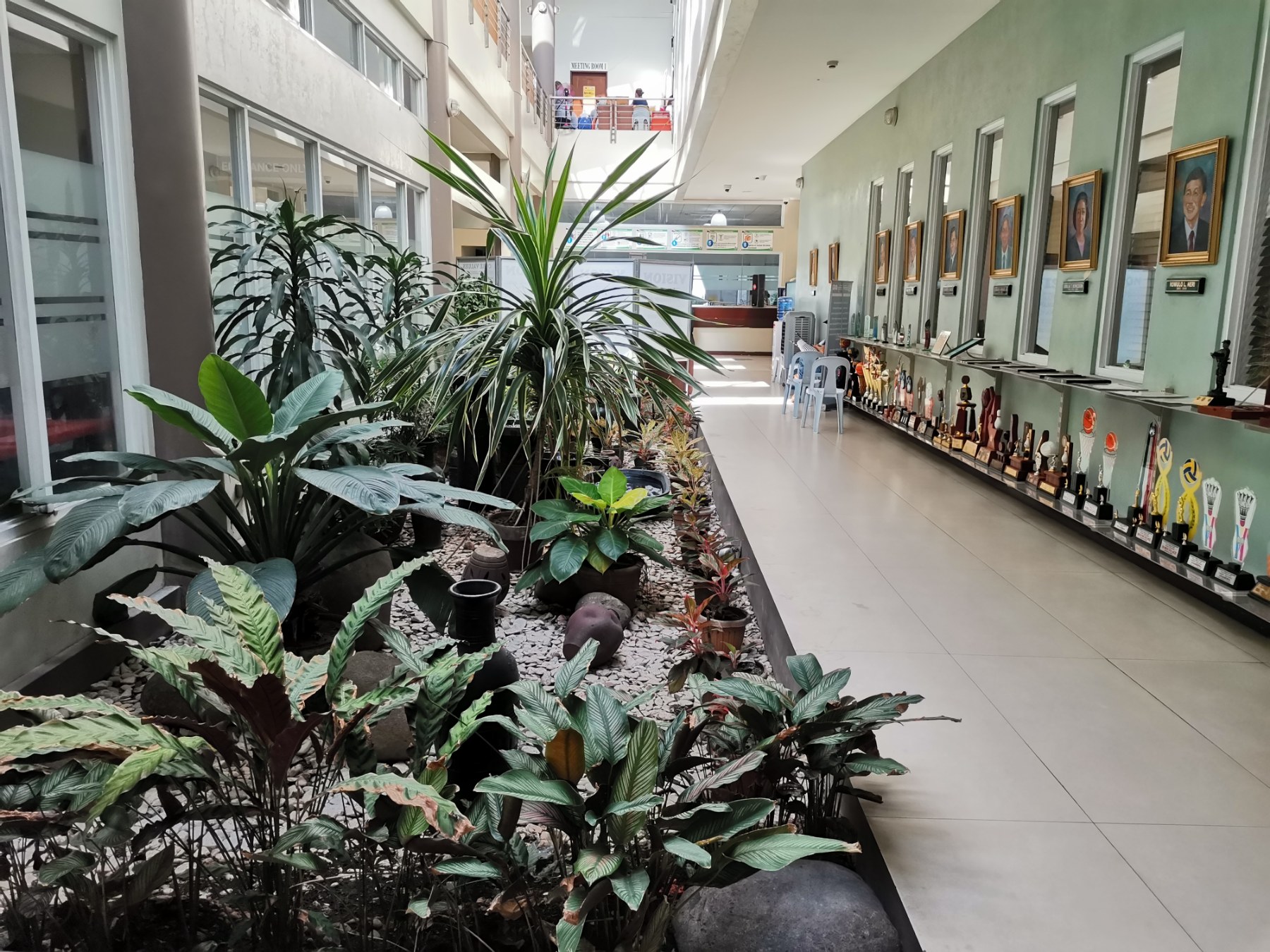
PS-DBM cultivates a green office space in an effort to maintain a healthy workplace environment.
The celebration of nutrition month in July is not what solely makes this time of the year verdant for the Procurement Service of the Department of Budget and Management (PS-DBM), as it also figuratively paints itself green by reinforcing eco-friendly initiatives.
The PS-DBM Retail Store, which makes common-use supplies and equipment (CSE) available to government employees for personal consumption, reopened on June 15, 2020. Clients are encouraged to bring their own eco-bags to carry the items they wish to purchase. This is to limit, if not completely prevent, the use of containers with substances that can be detrimental to the environment.
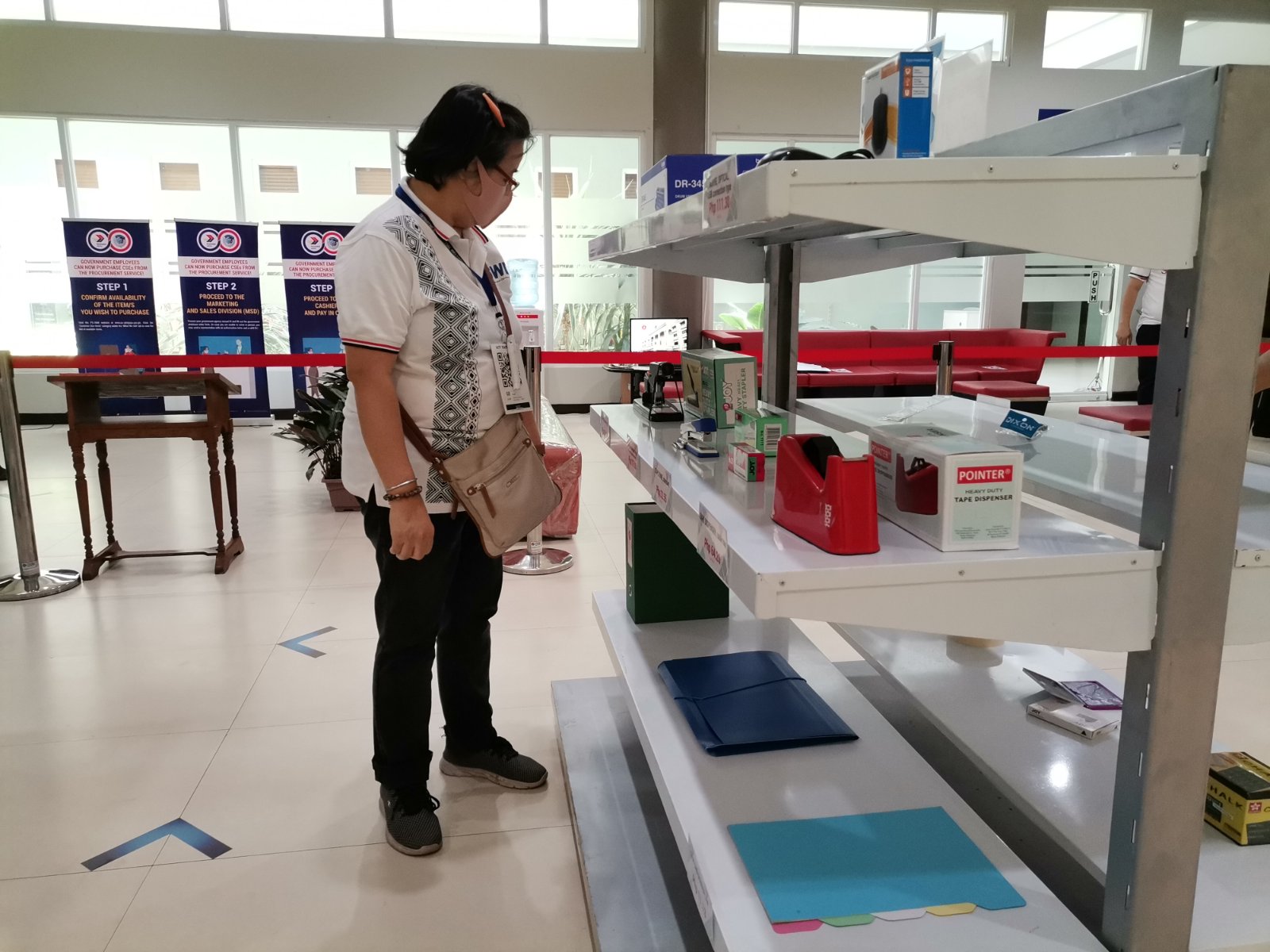
An employee of the Department of Social Welfare and Development checks available items for personal purchase at the PS-DBM Retail Store.
PS-DBM has long been an advocate of green initiatives. In September last year, the General Services Division (GSD) started regulating the use of single-use plastic and Styrofoam products. GSD also instigated policies on energy efficiency, water conservation, and solid waste segregation.
While no sanction is given to employees who may be found non-compliant with these programs, GSD banks on improved employee awareness.
“We are promoting employee engagement by making them part of the solution; contribute in whatever they can and hopefully it becomes a way of life. We want them to comply not because of fear for sanctions but because they understand the benefits,” said GSD Chief Mark Huertas.
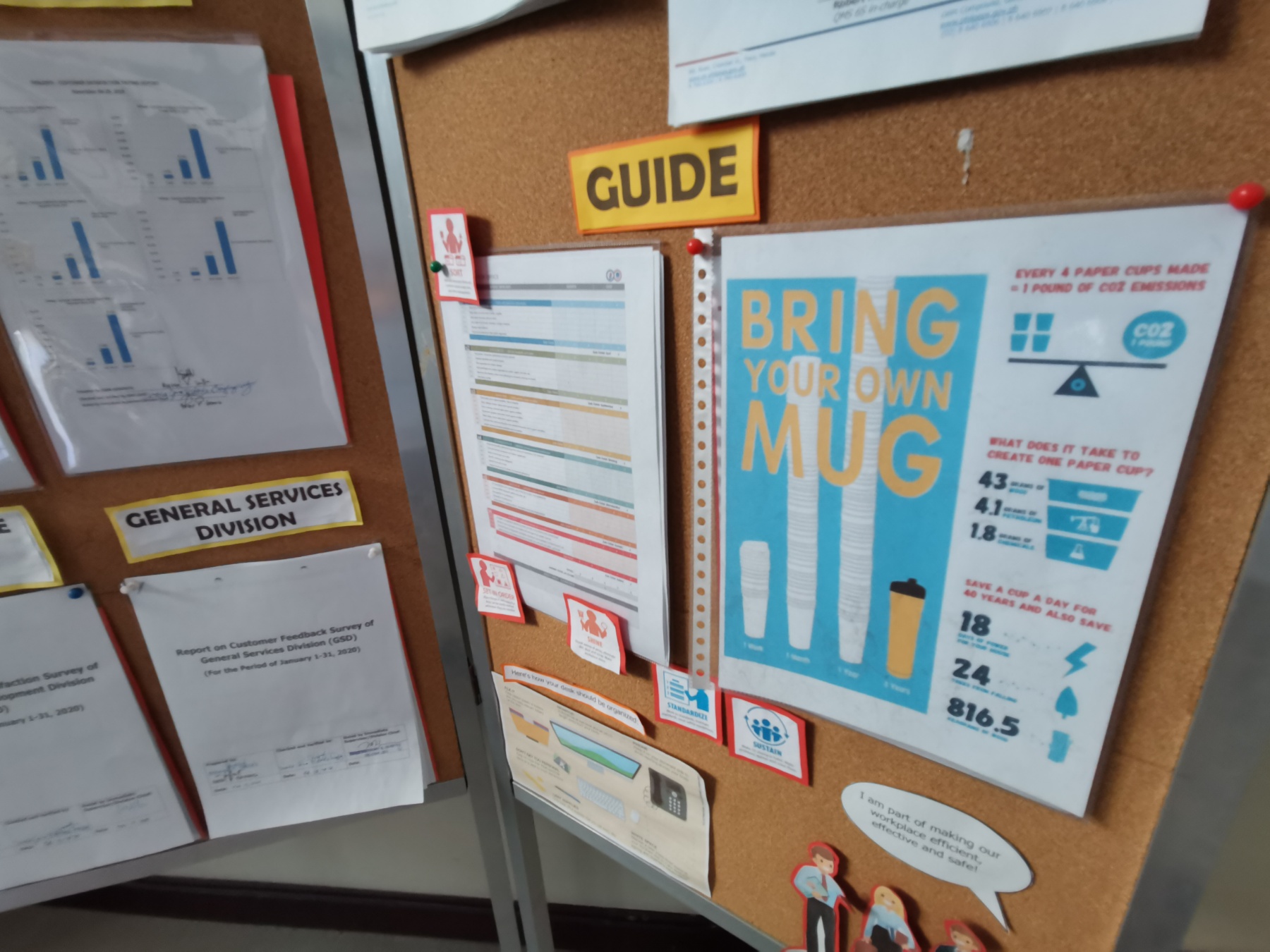
GSD encourages PS employees to bring their own mugs instead of using disposable water cups.
These measures, while proactively initiated, are also constitutionally mandated. Republic Act 9003, otherwise known as the Ecological Solid Waste Management Act of 2000, recognizes the government’s role in ensuring the protection of the environment.
Getting the green light
Going green, however, is not limited to the protection of natural resources. It also touches on the procurement of products considered environmentally advantageous, thus, the proclamation of Executive Order No. 301, s. 2004, establishing a Green Procurement Program (GPP) for all departments, bureaus, offices, and agencies of the executive branch.
Green procurement, according to the Philippine Center for Environmental Protection and Sustainable Development, is the act of procuring products where environmental considerations are incorporated.
For a more holistic approach, a measure that proposes to amend a House Bill seeking to establish GPP not only in the executive branch but in all branches of the government was passed on June 2, 2020.
The Government Procurement Policy Board (GPPB) through Resolution No. 13-2020 approved the issuance of position papers related to the substitute bill, aligned with the Philippine Green Public Procurement Roadmap (GPPR) of the GPPB Technical Support Office (TSO).
GPPR delegates PS-DBM as the lead agency in the practical implementation of GPP—the concept of which is included in the Philippine Development Plan until 2022 and one of the United Nations’ Sustainable Development Goals for 2030.
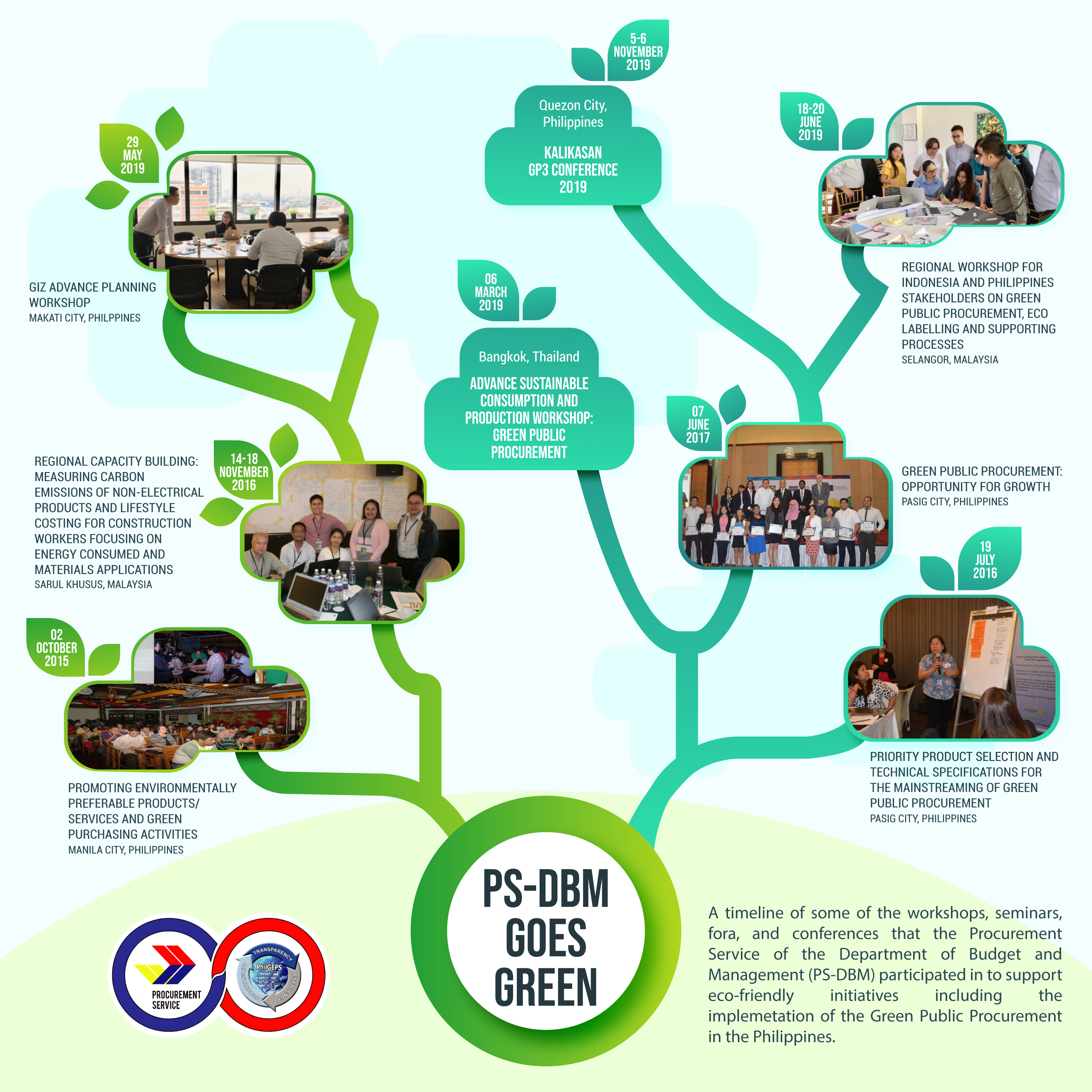
Infographic by Mildred Lozano
GPPR, furthermore, considers the expertise of PS-DBM staff as a major factor in implementing GPP in the Philippines. Enhanced through in-depth training courses that follow a “train-the-trainers” model, PS-DBM has consistently taken part in several local and international conferences to integrate GPP.
Despite the green light as signaled by both national and global policies, the execution of GPP is never a walk in the park. In previous discussions, certain issues and concerns were identified, including limited industry engagement and participation, lack of capacity building and awareness, and non-readiness of suppliers, among others.
Atty. Michelle Ann Recto, head of the PS-DBM Legal Division and one of the policy drafters of GPP in the local government framework, believes that harmonious collaboration between the government and the private sector leads to its practicable implementation.

Rosalinda Dapito and Atty. Michelle Ann Recto (center) of PS-DBM take note of inputs from other delegates during a regional workshop on GPP in Selangor, Malaysia.
“Sustainable growth is everybody's business. In an ever growing global economy, green procurement rises as both the sword and shield of states… As governments, representing their people, create and demand greener projects, suppliers and contractors—as the private partners of the government and the people—innovate to meet the demand, paving way to sustainable production and consumption,” she said.
Going green is going for the gold
As the State acknowledges that every product it purchases or avails of should be evaluated for its sustainability, the development of a standard template with GPP specifications in procuring both CSE and Non-CSE was necessitated. The assessment matrix consists of market readiness, environmental impact, cost implications, practicability, and support to government’s environmental objectives and the local economy.
By the end of 2019, of the ten (10) prioritized CSE, PS-DBM already incorporated the “Green Criteria” to six (6) items which are toilet paper, toilet bowl cleaner, trash bags, disinfectant spray, detergent powder, and LED lights/bulbs.
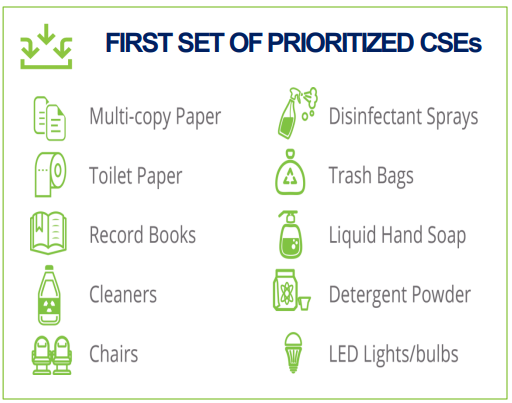
Screenshot from the GPPB-TSO presentation on GPPR.
Meanwhile, of the ten (10) prioritized Non-CSE, four items (4) which are desktop computers/laptops, air-conditioners, vehicles, and copiers are already GPP specified.
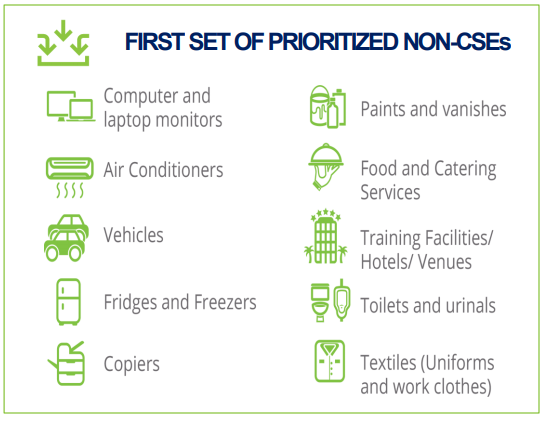
Screenshot from the GPPB-TSO presentation on GPPR.
The procurement of such items is part of the midterm (2019-2022) goals of GPPR, where all procuring entities at national, provincial, and local levels are guided to practice GPP. Also in the pipeline are the development of capacity building for Procurement Division’s personnel, bi-annual review of CSE items, creation of a Monitoring and Evaluation Committee for CSE, conduct of Suppliers’ Summit and Annual Vendors’ Day, and the collaborative engagement with the public sectors in charge of GPP advocacies. From 2022 and beyond, the ultimate objective is the advancement of GPP to Sustainable Public Procurement.
“PS-DBM, as the central procuring arm of the Philippine Government, stands as [GPP’s] torch bearer—enabling sustainable production and consumption by ensuring that the demand is at its very core: green, responsive, adaptive, and sustainable,” Atty. Recto emphasized.
Heed the call. PS-DBM goes green. So should you.
